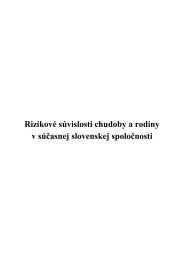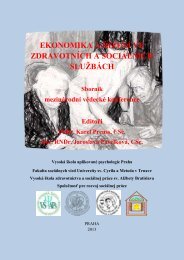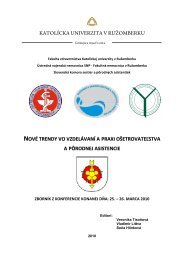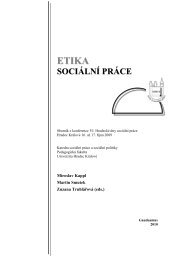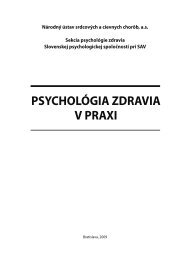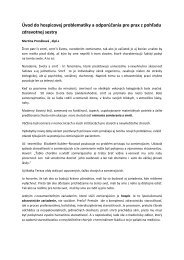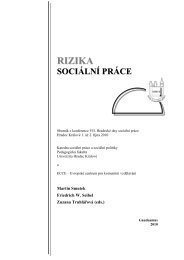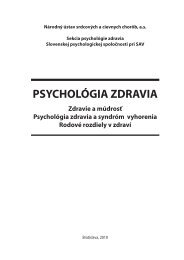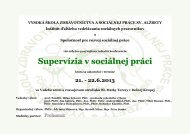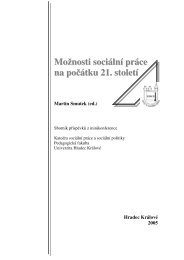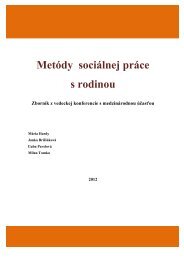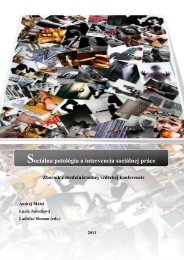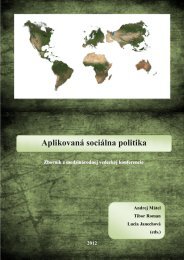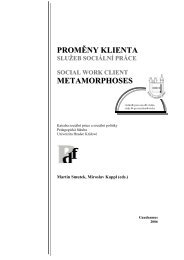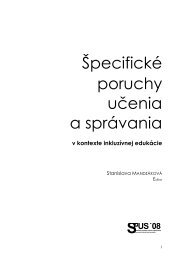Zmena klÃmy â možný dopad (nielen) na obyvateľstvo - Prohuman
Zmena klÃmy â možný dopad (nielen) na obyvateľstvo - Prohuman
Zmena klÃmy â možný dopad (nielen) na obyvateľstvo - Prohuman
Create successful ePaper yourself
Turn your PDF publications into a flip-book with our unique Google optimized e-Paper software.
citizenship education programmes as necessary to deepen and complexify the<br />
messages children receive from outside the classroom or pre-school.<br />
Testing Bruner’s assertion that all subjects can be taught to any child, this research<br />
process sought to arrive at suggestions for exploring global poverty with<br />
children in ways that are “intellectually honest” (Bruner, 1960, p. 33), age appropriate,<br />
avoid essentialist views of poverty and support children’s developing understanding<br />
of how the wider world works. The programme, arising from the<br />
research, suggests learning experiences which build an understanding of the<br />
daily experiences of some people living in vulnerable circumstances in developing<br />
countries. The approach avoids a language of poverty and need and provides<br />
a deeper understanding of how different people live, which can then facilitate<br />
more complex exploration of the justice issues which threaten people’s livelihoods.<br />
Issues such as access to water, electricity, food and adequate housing are<br />
problematised through story-based activities. For example, one of the learning<br />
experiences, developed from and tested in the research, encourages children to<br />
recognise the dependancy on local sources of food, experienced by some of the<br />
characters portrayed in the materials. It presents images of Kenya as fertile and<br />
fruitful, which problematises conceptions, evident in the research, of Africa as<br />
a barren continent and raises questions regarding the causes of food insecurity. In<br />
exploring this self-sufficiency, children are better placed, at a later stage, to understand<br />
the vulnerability of small-holder farmers and some of the causal relations<br />
that underpin chronic and acute hunger, as well as to critically review the implications<br />
of historic patterns of consumption characteristic of the global North. This<br />
approach supports a growing understanding of the world in which we live and<br />
begins an education in how the world works (Bryan et al., 2009; Oxfam, 1997).<br />
The research highlights not only differing approaches of educators to children<br />
and childhood but also the tendency to regard learning about people experiencing<br />
poverty as necessarily upsetting. Participant educators, who at the outset<br />
were uncomfortable about including global poverty in their teaching, did not regard<br />
exploring with the children different people’s sources of food, homes or daily<br />
tasks as problematic.<br />
Starting Beyond Bi<strong>na</strong>ries and Racial Categorisation<br />
This research reflects previous findings, in suggesting that young children readily<br />
absorb prevailing social attitudes and prejudice (Ruble and Martin, 1998; Connolly,<br />
1998; Killen et al., 2001). The considerable extent to which children as young as<br />
three are forming impressions of “Africa” and African people from images in the<br />
media and in fund-raising campaigns was evident in the findings from the first<br />
181



